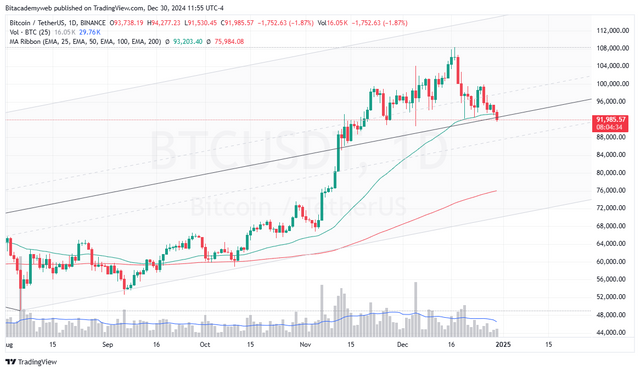The world's most popular cryptocurrency fell as uncertainty and new regulations stalk the market.
The price of bitcoin suffered a drop this morning, trading at USD 91,530.45 and falling 1.87%. The fall of bitcoin is exacerbated by the fear, uncertainty and doubt (FUD) generated by the activation of the MICA regulation in Europe, which prohibits the use of Tether (USDT) in the European community due to its lack of regulatory compliance.

Bitcoin is currently undergoing a critical test, piercing its 50-day exponential moving average (EMA50) for the first time since it began its bullish rally in October. / TradingView
The MICA regulation with USDT and the impact on bitcoin
The implementation of the MICA regulation significantly impacts the cryptocurrency ecosystem in Europe. This regulation not only limits the use of USDT, which, despite the difficulties, continues to be the dominant stablecoin with a market capitalization of USD 139.01 billion. It also makes investors reconsider their strategies in an environment of greater uncertainty.
According to Defillama data, the stablecoin market remains robust, with a total capitalization of around USD 205 billion. However, capital outflows and speculation about a possible further fall in bitcoin have increased pessimism among traders.
A strong dollar and ETFs in retreat
The strength of the dollar is also influencing this fall, especially with the forecasts that the Federal Reserve will keep interest rates high at 4.50% at the end of January. This favors the US currency, while cryptocurrencies, including bitcoin, seem to suffer.
In addition to this, exchange-traded funds (ETFs) experienced a negative net flow, marking the largest single-day capital outflow recorded to date. Bitcoin open interest fell to USD 57.80 billion, the lowest level since mid-November. This reveals a decline in market interest in cryptocurrencies.
However, long-term investors, or known as “cruisers,” are increasing their BTC positions. This indicates that big investors might be taking advantage of the opportunity. Since the leading cryptocurrency is in a pullback, cruisers increased their BTC holdings from 4.61 million coins to 5 million BTC. Cruisers are investors who typically hold coins for longer periods of time than five years.
Technical Analysis: Collapse or Recovery?
Bitcoin is currently undergoing a critical test, piercing its 50-day exponential moving average (EMA50) for the first time since it began its bullish rally in October. If BTC closes below this average, the pullback could continue. However, trading volume on the spot market has declined, suggesting that the EMA50 could act as support in the coming days.
Despite the uncertainty, Tether remains the strongest stablecoin in the market, dominating 67.79% of the sector, while its main competitor, USDC, barely reaches USD 43.58 billion in market capitalization.
An uncertain outlook
The current situation presents a dilemma for investors: keep an eye on the MICA regulation and its implications, while navigating an environment of higher interest rates and cryptocurrency market volatility. In this sense, the future of Bitcoin and USDT remains uncertain, but what is clear is that investors' attention remains on how these dynamics will play out in the long term in the financial ecosystem.
Disclaimer: This news is for informational purposes and should not be construed as financial advice. Investing in cryptocurrencies involves risks, and thorough analysis is recommended before any investment decision.
Upvoted! Thank you for supporting witness @jswit.
Downvoting a post can decrease pending rewards and make it less visible. Common reasons:
Submit
Here in Europe it seems that stablecoins should have a hard time in 2025. USDT will probably be the first to be hit. I think there will be 2 difficult years where cryptocurrencies will have to face a regulation that will change continuously, because for now the regulation is imperfect.
Downvoting a post can decrease pending rewards and make it less visible. Common reasons:
Submit